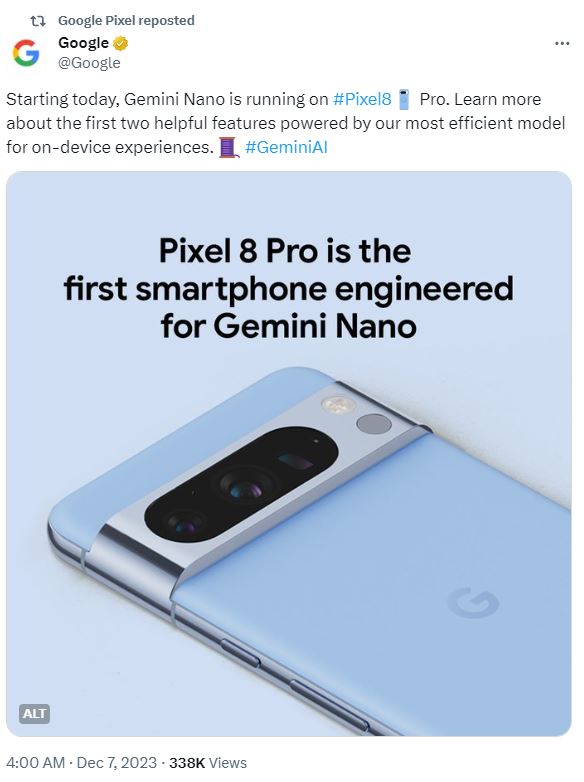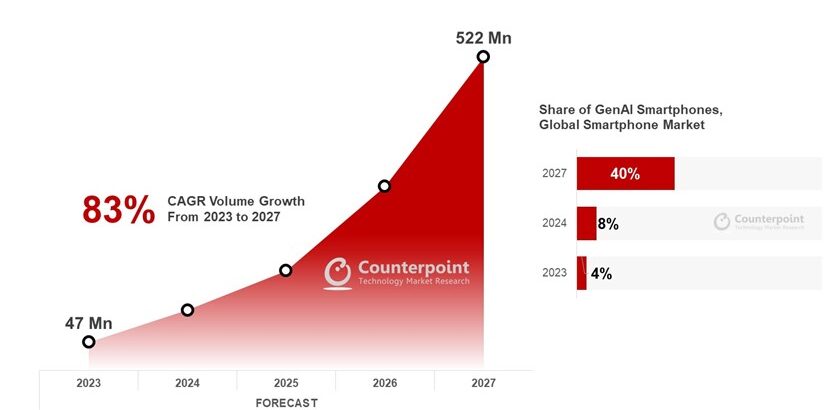
What exactly are generative AI smartphones? (Image generated by AI).
Generative AI smartphones will see increased demand in 2024
- Samsung to capture almost 50% of the generative AI smartphone market share over the next two years.
- Chinese mobile phone developers are also hoping to develop generative AI smartphones.
- The Google Pixel 8 can be considered the first generative AI smartphone.
Generative AI is making its way into almost every product today. From smart cars to every application imaginable on smartphones, the capabilities of generative AI also make it desirable to many. Many organizations are increasing their investments in generative AI applications at the workplace. Consumers are also enjoying the capabilities of generative AI, especially in how it solves tasks for them.
Generative AI is also expected to be embedded into smartphones. In fact, according to a report by Counterpoint Research, 2024 will be pivotal for generative AI smartphones, with preliminary data projecting their shipments to reach over 100 million units. By 2027, Counterpoint Research predicts generative AI smartphone shipments to reach 522 million units, growing at a CAGR of 83%.

The Google Pixel 8 can be considered the first generative AI smartphone.
What are generative AI smartphones?
While most smartphones today have some form of AI built into them, generative AI smartphones offer a lot more than just pre-programmed responses or performing predefined tasks. For example, Apple’s Siri is not a generative AI chatbot but rather a built-in, voice-controlled personal assistant for Apple users that is powered by AI. It does not feature the capabilities a generative AI chatbot on a smartphone would have.
Apple has not rolled out generative AI products or services but according to reports, the tech company has plans for a generative AI smartphone in the future. The aiPhone?
Meanwhile, Google’s recently launched Pixel 8 Pro is the first smartphone with generative AI built into it. The device is currently running on Google’s Gemini Nano, with more AI updates and features expected to be unveiled in future models. Gemini Nano allows users to have a more helpful, productive and personalized experience on the device. Users could use the generative AI on the Pixel 8 to draft emails for them, make appointments with their contacts and do a handful of other useful – but not earth-shattering – tasks.
Samsung has also unveiled plans for its version of a generative AI smartphone. The AI model, called Samsung Gauss, is designed for AI applications on all its devices. Samsung Gauss is a generative language model that can help compose emails and translate content. It can also enhance consumer experience by enabling smarter device control when integrated into products.
Samsung Gauss is also capable of enabling software developers to write code quickly. The generative AI can also generate and edit images, a prominent and favorable feature for generative AI users.

Chinese mobile phone developers are also hoping to develop generative AI smartphones. (Image generated by AI).
Chinese cell phone developers are also hoping to develop generative AI smartphones. A report by South China Morning Post revealed that Chinese smartphone maker Oppo is doubling down on its AI research efforts as competition among smartphone makers to integrate ChatGPT-like products within handsets heats up.
The Chinese smartphone maker is actively investing in generative AI, including the development of its own large language model (LLM) named AndesGPT. Oppo’s research arm and engineering team for hardware and software are fully engaged in these efforts, said Jason Liao, president of Oppo Research Institute.
Xiaomi is also hoping to develop its own generative AI smartphone. In a report by Forbes, Xiaomi’s founder and CEO Lei Jun announced in August this year that his company’s digital assistant, which is called Xiao Ai, had begun upgrading to include generative AI capabilities. It’s said to be supported by a lightweight AI model with 1.3 billion parameters that runs locally on the phone, which Xiaomi says performs just as well as a model with 6 billion parameters running on its cloud computing service.

Source: Counterpoint Research Smartphone 360 Service, GenAI Smartphone Shipments and Insights Report.
Mobile devices of the future
Despite Google’s capabilities, Counterpoint Research sees Samsung and Qualcomm as the immediate leaders as their current product offerings and capabilities position them as first movers in the market.
The research predicts Samsung to capture almost 50% of the market share over the next two years, just as it did with foldable devices. Chinese device makers like Xiaomi, Vivo, Honor and Oppo will also be key players in the market.
Qualcomm is likely to capture over 80% of the generative AI smartphone market for the next two years. MediaTek is likely to catch up with its Dimensity 9300-based devices.
“The share of generative AI smartphones in the overall smartphone market will be in single digits through next year. But those numbers will not accurately reflect the amount of excitement and marketing hyperbole we are expecting to see,” said Tarun Pathak, research director at Counterpoint Research.
Pathak also said the industry is working towards a standard definition to be developed by reflecting on inputs from across key players. He added that 2024 will be more about learning about these devices, with an inflection point expected around 2026, as the devices permeate through the broader price segments.
Meanwhile, VP & research director Peter Richardson said, “AI has been a feature of smartphones for the last few years. We now expect to see the emergence of smartphones optimized to run generative AI models in addition to the normal use of AI in smartphones. The likely use cases will include creating more personalized content, smarter digital assistants with unique personalities and conversation styles, content recommendations, and more.”
However, Richardson also believes that this will require addressing issues like running into memory constraints and will likely lead to a hybrid approach in some cases.
“Nonetheless, one thing is for certain – we are entering an era where smartphone users no longer need to align to their devices; it will be the other way around with generative AI smartphones,” concluded Richardson.
READ MORE
- 3 Steps to Successfully Automate Copilot for Microsoft 365 Implementation
- Trustworthy AI – the Promise of Enterprise-Friendly Generative Machine Learning with Dell and NVIDIA
- Strategies for Democratizing GenAI
- The criticality of endpoint management in cybersecurity and operations
- Ethical AI: The renewed importance of safeguarding data and customer privacy in Generative AI applications




